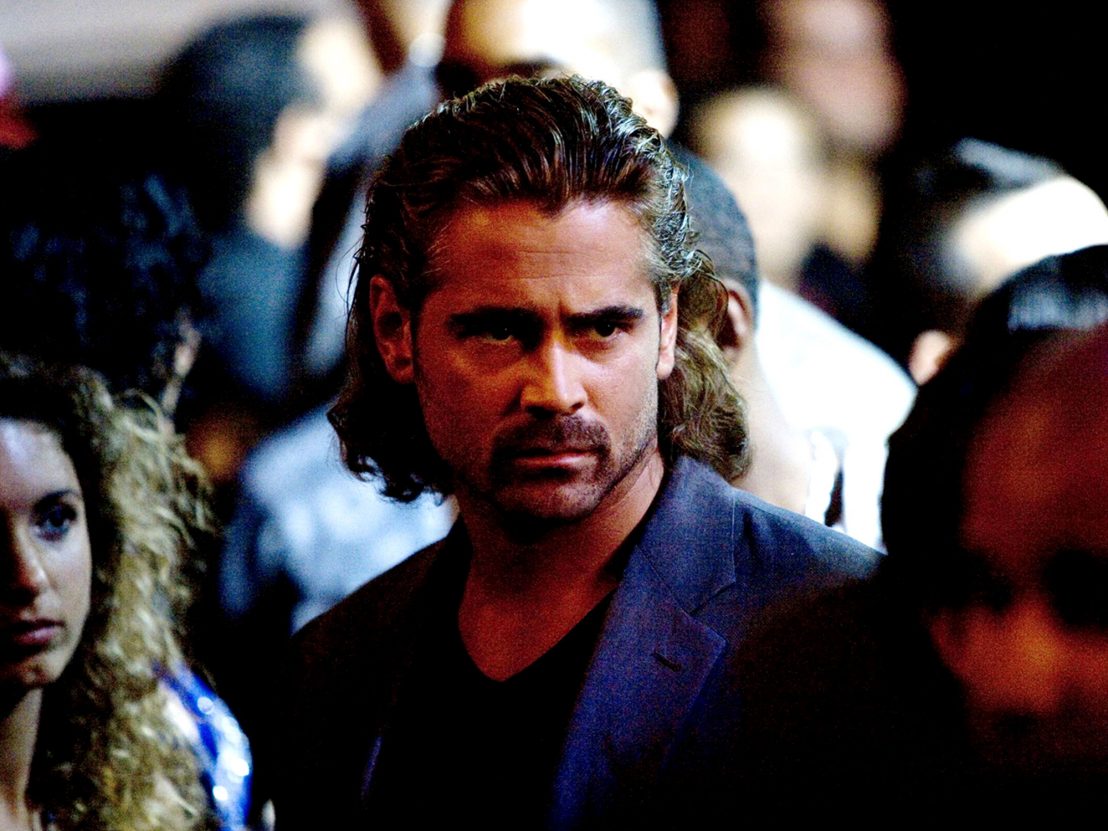
A pair of ex-undercover agents responsible for training Colin Farrell for Michael Mann’s Miami Vice tell a fascinating story in the making-of documentary Miami Vice: Undercover. In order to cement for Farrell the life-and-death reality of the job, as well as the psychological impact of undercover work, they engineered a fake drug deal that teeters on disaster. With actors posing as the skittish dealers, Farrell was oblivious to the fact that he was, in effect, being Punk’d.
Watching the footage of the deal is remarkable. Farrell, in full Sonny Crockett makeup, defensively pushes himself against the wall as an actor grips a gun nearby; in voiceover Farrell explains that the exchange kept him up at night for weeks. Indeed, the actor has since revealed that he found the experience of making Miami Vice incredibly difficult. He regularly abused drugs and alcohol during filming, checking into rehab soon after wrapping. It’s a disturbing parallel to the trajectory of his character in the film, a person pushing themselves to the limits at all costs.
Mann has stated that his Miami Vice remake is a story of identity and performance. How do you keep control of the line between reality and fiction in a world where a bad take doesn’t end in ‘cut’, but with a bullet? Widely dismissed at the time of its release, the film’s dense, dreamlike approach to evoking this idea has since earned it an ardent following. Perhaps it’s understandable that it initially left audiences cold though. Consider the opening scene, set to Jay-Z and Linkin Park’s ‘Numb/Encore’, which jarringly drops us in media res into a nightclub stakeout.
Mann has long wielded fairly generic rock music as a blunt but powerful emotional tool – but rarely as audaciously as this. Information is flung at the viewer at such a pace that it is almost impossible to keep up. The director replicates the disorienting, uneasy point of view of Crockett and his partner Ricardo Tubbs (Jamie Foxx) to the extent that we seldom have a view of the full picture.
“Mann’s work is unapologetically masculine, but he understands the vulnerability that lies beneath the tough exterior of his male characters.”
If the film’s air of self-indulgent cool comes off as cheesy, it’s never winkingly so. Miami Vice takes itself so seriously, in fact, that it makes it easier for the viewer to sink into the constructedness of these characters’ identities. When Crockett is drawn into a sweltering romance with businesswoman and drug trafficker Isabella (Gong Li), it threatens to overturn the delicate balance he and Tubbs have established in their undercover dealings with a fearsome drug empire.
Mann creates an intoxicating atmosphere, mirroring the rush of power and ecstasy that enables Crockett to get lost in his role. This is particularly true of the courtship sequence which culminates in a stunning moment of primal attraction, with Crockett and Isabella temporarily escaping on a speedboat to get mojitos in Havana.
Critics at the time pointed to this sequence as the weakest aspect of the film, a needless diversion from the main story. Watching it back, however, it’s clear this is the passionate, thumping heart of the film. The way Mann frames the two actors – leaning back in their seats, fiddling with their seatbelts and the boat’s controls – coupled with the roaring engine and soaring soundtrack, is undeniably erotic.
Mann’s work is unapologetically masculine, but he understands the vulnerability and need to be seen and touched that lies beneath the tough exterior of his male characters. Miami Vice is at once his most hyper-masculine and tender work. It’s one of Farrell’s best performances, too, his greasy machismo barely concealing the existential crisis the character is going through, which only deepens as the film proceeds.
By all accounts, Mann ran a very tough set. Perhaps the film’s diffuse nature and some of its darker elements can be put down to the fact the production was in near constant turmoil, plagued by hurricanes, volatile cast members and poor word of mouth. It’s a visually gloomy film, too, with Mann (who was enthralled by his digital camera’s ability to push into inky blackness with far more range) even shooting daytime sequences in muted blues and greys. Throughout the film, as within the characters themselves, thunder and lightning fill the horizon. A storm constantly threatening to break.
Published 28 Jul 2021

In Michael Mann’s scorching debut, James Caan chases a dream he knows he can never achieve.

By Simran Hans
Simran Hans considers the link between two of America’s most prominent and progressive leading men.

There’s more to his larger-than-life turn than meets the eye.